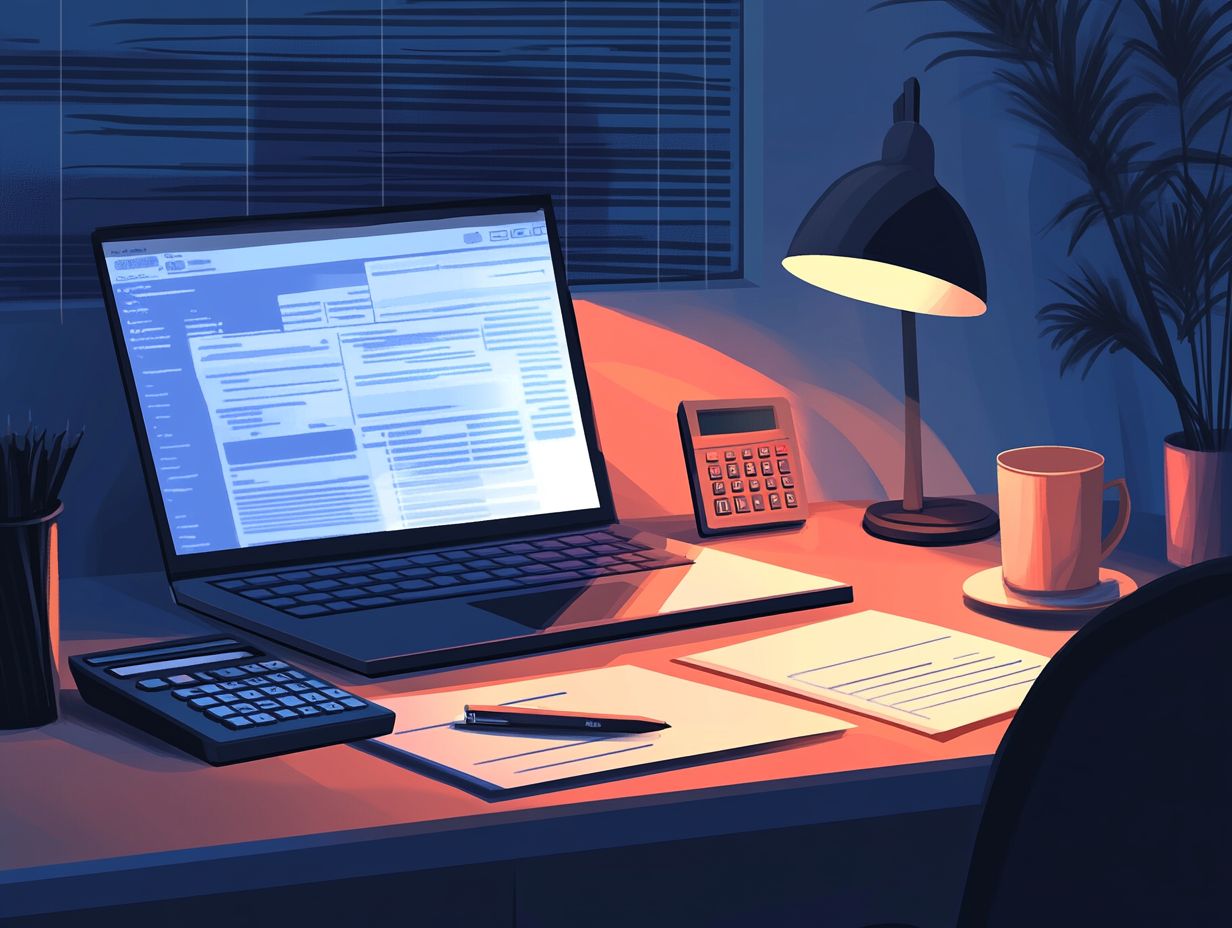How to Handle Back Taxes as a Freelancer
Freelancing provides flexibility and independence. However, it also brings distinct financial responsibilities that cannot be overlooked.
One of the most intimidating hurdles freelancers encounter is the management of back taxes. Understanding what back taxes are, the common pitfalls that lead to their accumulation, and strategies for effective resolution can spare you from undue stress.
This article serves as your comprehensive guide to navigating back taxes. It offers insights into resolution options and preventive measures, ensuring you stay aligned with your financial obligations.
Contents
- Key Takeaways:
- Understanding Back Taxes for Freelancers
- Common Reasons for Owning Back Taxes
- Options for Handling Back Taxes
- Preventing Back Taxes in the Future
- Frequently Asked Questions
- What are back taxes and why do freelancers need to handle them?
- How can I determine if I owe back taxes as a freelancer?
- What can I do if I can’t afford to pay my back taxes all at once?
- Do I need to file an amended tax return if I discover I owe back taxes?
- What happens if I ignore my back taxes as a freelancer?
- Can I negotiate a lower amount for my back taxes as a freelancer?
Key Takeaways:

- Know what back taxes are and how they can affect freelancers financially.
- Common reasons for owing back taxes include not reporting all your earnings or mixing up your business expenses.
- Options for handling back taxes include payment plans, settlement options, and, in extreme cases, filing for bankruptcy.
Understanding Back Taxes for Freelancers
Grasping the intricacies of back taxes is essential for freelancers as they navigate the often-complicated terrain of IRS regulations. You face distinct challenges when it comes to tracking your income, claiming business expenses, and ensuring compliance with constantly changing tax obligations. Knowing how tax laws apply to your specific situation can help prevent future issues with back taxes.
Without a solid understanding of these factors, you could find yourself in the unfortunate position of owing back taxes, leading to serious financial and legal ramifications. This guide aims to clarify back taxes and empower you to manage your tax liability effectively, helping you sidestep the potential pitfalls that may arise during navigating quarterly taxes as a freelancer.
What are Back Taxes?
Back taxes are unpaid taxes you owe to the IRS. They can accumulate for various reasons, such as not reporting all your earnings or neglecting to make estimated tax payments.
These liabilities emerge when individuals or businesses overlook their tax responsibilities, resulting in penalties and interest that can drastically inflate the total amount owed. To avoid such issues, creative freelancers should be aware of the 5 essential tax tips. The IRS determines back taxes based on your original tax return filings, making adjustments for any discrepancies identified during audits or reviews.
If these taxes remain unpaid, the repercussions can be severe, including wage garnishments, asset seizures, and a detrimental impact on your credit score. Knowing your tax obligations is crucial! To navigate these responsibilities effectively, consider following tax planning tips for new freelancers. Tackle your back taxes early to avoid future issues and maintain a good standing with the IRS.
Common Reasons for Owning Back Taxes
Freelancers often owe back taxes due to the complex rules of self-employment taxes. Common pitfalls include underreporting income and misclassifying expenses.
Underreporting income can occur when freelancers overlook earnings from 1099 forms, which may lead to potential back taxes. Misclassifying expenses can result in missed deductions. To avoid these pitfalls, check out the top tax mistakes freelancers make and how to avoid them. By familiarizing yourself with IRS regulations and seeking advice from tax professionals, you can maximize your eligible tax deductions and navigate the complexities of expense classification effectively.
Grasping these issues is essential for maintaining compliance with IRS regulations and effectively minimizing your tax liability.
Underreporting Income
Underreporting income is a pitfall many freelancers face. Even small additional income sources can be overlooked, leading to discrepancies that attract tax authority scrutiny.
The repercussions of underreporting can be quite serious, including the possibility of IRS audits, which may result in substantial penalties and interest on any unpaid taxes. To keep your financial records in check, consider utilizing accounting software, maintaining receipts diligently, and regularly reviewing all income sources. Additionally, understanding the importance of keeping tax records for freelancers will ensure compliance and spare you unnecessary stress when tax season rolls around.
Misclassifying Expenses

Misclassifying expenses can create big tax problems. Many freelancers overlook common costs, including home office expenses, software subscriptions, and business meals. The IRS has specific guidelines regarding what qualifies as a deductible expense, making accurate documentation crucial for maintaining compliance and maximizing your financial benefits.
When you fail to categorize your expenses correctly, you not only risk paying more in taxes but also open yourself up to potential audits due to inconsistencies.
By familiarizing yourself with IRS regulations and seeking advice from tax professionals, you can navigate the complexities of expense classification effectively, ensuring that you fully capitalize on the allowable deductions available to you.
Options for Handling Back Taxes
Freelancers with back taxes have options to manage their obligations. Consider structured payment plans or an Offer in Compromise to ease your financial stress while ensuring compliance with IRS regulations.
Seek advice from tax professionals for valuable insights, guiding you through these options with expertise and confidence.
Payment Plans
One effective option for freelancers facing back taxes is to establish a payment plan with the IRS. This allows you to pay off your tax liability gradually, avoiding further penalties.
This arrangement also provides immediate relief and helps you maintain financial stability by preventing additional fines.
To qualify for these plans, you’ll typically need to demonstrate that you can make the required payments without defaulting, adhering to the IRS’s eligibility criteria. This often includes filing all necessary returns and owing a manageable amount.
The application process usually involves completing Form 9465, where you’ll outline your financial situation and propose a repayment schedule. For those working contract jobs, understanding how to handle tax payments is crucial. By staying compliant with these regulations, you can effectively manage your debts while ensuring you remain in the IRS’s good graces.
Offer in Compromise
An Offer in Compromise (OIC) allows freelancers like you to settle back taxes for less than the total amount owed, as long as you meet the specific eligibility criteria set by the IRS.
By using this process, you can significantly reduce the money issues caused by substantial tax liabilities and streamline your overall tax obligations.
To qualify for an OIC, you’ll need to show that paying the full amount would create a financial hardship. You can illustrate this through your income, monthly expenses, and assets.
It’s essential to keep your tax filings current; any unfiled returns could disqualify you from negotiating with the IRS. For freelancers, understanding how to estimate your taxes can be particularly important. The application process requires submitting Form 656 along with a $205 fee and documentation that highlights your financial situation and your intent to resolve your tax issues.
Filing for Bankruptcy
If you are overwhelmed by back taxes, you may need to consider filing for bankruptcy as a way to manage your situation. However, this should always be a last resort due to the complex implications it brings.
Understanding how bankruptcy could impact your tax obligations is crucial. Not all tax debts are eligible for discharge. For example, income taxes that are less than three years old or taxes you failed to file will still be due even after bankruptcy.
State tax obligations can pose unique challenges that may differ from federal liabilities. You should carefully assess your situation and look at other options like payment plans or offers in compromise before turning to bankruptcy. Consulting with a tax professional or a specialized attorney can provide invaluable guidance as you navigate these tricky waters, especially if you’re a freelancer considering how to choose the right tax software.
Preventing Back Taxes in the Future

To safeguard against future back taxes, freelancers should embrace proactive strategies. This includes meticulous record-keeping, enlisting the expertise of a tax professional, and ensuring timely estimated tax payments to remain compliant with IRS regulations.
Proper Record-Keeping
Proper record-keeping is crucial for freelancers to effectively track their income and business expenses. This ensures you can prove your tax deductions and stay compliant with IRS regulations.
Maintaining organized records doesn’t just help you navigate the often daunting complexities of tax season; it also offers a clear overview of your financial health throughout the year. You should prioritize keeping receipts for all business-related purchases, documenting invoices, and maintaining a detailed ledger of your income and expenses.
It’s vital to distinguish between your personal and business finances to avoid complications in the future. Utilizing accounting software like QuickBooks and Expensify can significantly streamline this process. Additionally, understanding how to save for taxes as a freelancer can further help in managing your finances. These tools automate expense tracking and generate insightful reports, enabling you to make informed financial decisions while saving you precious time.
Are you sure you’re keeping track of your deductions? Don’t let back taxes overwhelm you. Start your payment plan today!
Hiring a Tax Professional
Hiring a tax professional can be a game-changer for freelancers. They provide expert guidance on following tax rules and help you navigate the intricate world of IRS regulations.
This support ensures you maximize every available tax deduction and credit. It becomes essential, especially with the complexities and nuances that come with self-employment taxes.
Keeping pace with ever-changing tax laws or accurately understanding your filing requirements can be daunting. By consulting a tax professional, you gain clarity regarding your obligations and invaluable support in organizing your financial records.
These professionals can craft strategies tailored to your situation, unlocking potential savings and refunds. It’s wise to consider bringing a tax expert on board as your business flourishes, when you encounter unique financial situations, or when you desire peace of mind regarding your tax responsibilities. Familiarizing yourself with tax tips for freelancers in the gig economy can also be beneficial.
Making Estimated Tax Payments
Making estimated tax payments is essential for freelancers. This practice helps you manage your self-employment tax obligations and prevents the accumulation of back taxes throughout the year.
By proactively addressing these responsibilities, you can sidestep unexpected tax bills and potential penalties. To determine the right estimated payment amount, it’s vital to calculate your expected annual income, factoring in any deductions or credits.
You can then divide this estimate into quarterly payments, aligning with IRS deadlines to ensure compliance. Understanding these timelines and maintaining a disciplined approach cultivates financial stability.
This approach also frees you to concentrate on your creative endeavors, unburdened by the stress of impending financial issues.
Frequently Asked Questions
What are back taxes and why do freelancers need to handle them?

Back taxes are the taxes that freelancers owe from previous years. Freelancers must handle them because failure to pay can lead to penalties, interest, and even legal consequences.
How can I determine if I owe back taxes as a freelancer?
You can determine if you owe back taxes by reviewing your past tax returns or consulting with a tax professional. A notice from the IRS or state tax agency may also indicate owed back taxes.
What can I do if I can’t afford to pay my back taxes all at once?
If you can’t pay your back taxes fully, you may set up a payment plan with the IRS or state tax agency. This allows smaller, more manageable payments over time.
Do I need to file an amended tax return if I discover I owe back taxes?
Yes, if you discover that you owe back taxes, you need to file an amended tax return for the year(s) in question. This ensures you accurately report your income and pay the correct amount of taxes.
What happens if I ignore my back taxes as a freelancer?
If you ignore your back taxes, the IRS or state tax agency may take enforcement actions such as placing a lien on your assets or garnishing your wages. It’s crucial to address back taxes promptly to avoid these consequences.
Can I negotiate a lower amount for my back taxes as a freelancer?
In certain situations, you can negotiate a lower amount for your back taxes. This is known as an offer in compromise and involves proving financial hardship to the IRS or state tax agency. It’s best to consult with a tax professional for guidance.
Get started on your taxes today!






